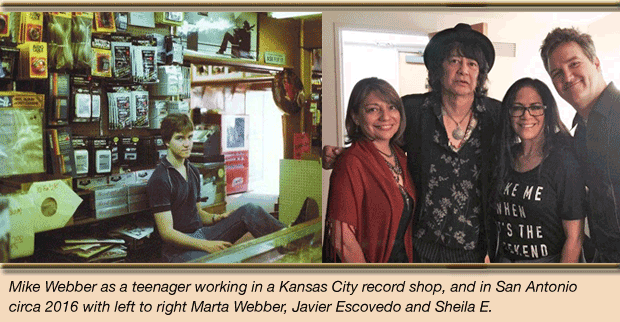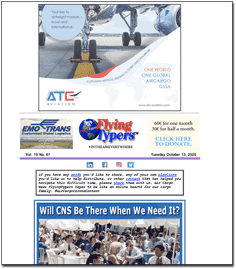|
Often these days we hear the words:
“We are OK, safe inside of our bubble.”
I have often wondered how secure some of
these perceived ‘bubbles” are.
We are also reminded of our Son Geoffrey
II about 20 years ago, the day he left Queens, New York and headed out
to Hollywood where he starred as Flipper Boy in his first big production
movie titled Bubble Boy.
Today I guess we all live in some kind of
bubble and like the Bubble Boy in Geoffrey’s movie, we all have
to learn how to live, breathe, think and move around for some time longer
inside it.
Mike Webber has contributed a diverse array
of articles to FlyingTypers over the years. From data-rich state-of-the-industry
overviews to features about the Beatles’ arrivals at JFK and LAX
that were shared in music (and Pan Am) forums where FlyingTypers doesn’t typically land.
An Op-Ed he wrote for us in 2011 about egregious
corporate welfare for a wealthy developer in St. Louis sparked a legislative
debate in Missouri that killed the project. One of the airport industry’s
most respected cargo consultants and one of our favorite dinner companions
at conferences, we decided to check in with Mr. Webber in his beloved
Austin city limits.
FT: Since
COVID-19 arrived, you left global airport planning firm Landrum &
Brown (L&B) to restart your own independent consultancy, Webber Air
Cargo. What have you seen in the air cargo industry?
MW: Before
I left L&B, I had ongoing cargo-oriented projects at two major U.S.
international airports. Rather than being downgraded like so many other
airport projects, cargo projects grew in emphasis for both airports. The
pandemic has negatively affected some cargo efforts but in less obvious
ways. Projects have been delayed in some cases because airline representatives
responsible for properties and facilities planning took early retirement
and their replacements were less prepared to proceed.
Secondarily, available capital
for tenant-specific improvements has been affected by general financial
conditions, even as cargo has proven more resilient than the passenger
side of the business. From my own perspective, cargo-related consulting
opportunities are as abundant as ever. The evolution of Amazon is affecting
networks and infrastructure more tangibly, precipitating attention to
air cargo at airports for about the last five years.
FT: No complaints
then?
MW: Oh, always!
I mentioned institutional memory lost to furloughs and early retirements
and that applies not only to airlines but also to cargo trade associations.
Some of that talent may reappear in another form but undoubtedly some
will go fishing permanently. I would have liked to have hugged and thanked
some of those individuals but these weren’t ordinary retirements.
The influence of some people is
irreplaceable. Ram Menen retired 7 years ago and as far as I’m concerned,
the industry remains poorer for the loss of his intellect, imagination
and integrity. He transcended a mere company and was an industry leader
of a kind that I simply haven’t seen since.
Some of the rank opportunism and
fearmongering we see now in our industry is reminiscent of bad behavior
we saw after 9/11 when consultants scurried around declaring themselves
to suddenly be security experts who would protect civilization. As with
the cargo security task forces that actually worked on strengthening the
industry, the heavy lifting was done by considerate people who were serious
about their mission and shied away from attention. Meanwhile, people wholly
out of the loop were only too willing to offer their worthless opinions
to anyone holding a camera and microphone.
FT: What
must our industry do?
MW: We plan
airports and most infrastructure on 25 to 30-year planning horizons and
that shouldn’t change for distribution of a vaccine that might have
a critical lifespan of about 18 months. The premium paid for air transport
versus other modes and the relative value and perishability of air cargo
commodities should guarantee that airports are not intended for long-term
storage even in conventional times but especially not during a pandemic.
Fortunately, life sciences were already
established demand-drivers before this pandemic, so some essential improvements
in facilities and operations were already matriculating in less panicked
times. These improvements should be expanded and wherever reasonable,
expedited but with attention to long-term benefits. With the cargo security
working groups, I don’t recall great acrimony around costs of improvements
but rather that any investments had to deliver what was necessary and
not just what would provide the illusion of security. A similar mindset
is required now for this challenge.
We need to extract some enduring
lessons because COVID-20 or something comparable is probably already incubating
somewhere. The multilateral institutions need to marshal lessons from
industrialized nations that can be shared with developing countries where
economies of scale, infrastructure and network deficits compromised the
general welfare more than in countries where Amazon, FedEx and UPS reliably
deliver groceries and other necessities to residential front-doors.
Many developing countries almost wholly
rely on belly cargo capacity that dried up as passenger flights ceased
or were reduced, causing residual impacts as seasonal perishable exports
encountered reduced capacity. In such cases, governments need to recognize
that air cargo capacity must be elevated to national security standing
before the next pandemic.
FT: About
that brain drain at the trade associations . . .
MW: Let’s
not forget that staff members who may not have received the benefit of
Op-Eds and tributes in trade publications also served us well. I hope
that Carmen Alvarez and Walesa Tejeda (CNS staff) know how much we appreciate
them and unless they find something more rewarding, I hope they remain
in our industry.
As to Glyn and Mike, I am confident
that we’ll see them again soon. In a period of unpredictability,
general confidence is critical and those two individuals have the necessary
recognition and experience for such a time. They also have demeanors that
allow them to ask for help when necessary and to inspire support from
those they ask. Whether they become my respected competitors in the consulting
world or one may wind up leading another trade association, I will be
glad to see them on the field.
FT: Speaking
of another trade association, TIACA has an opening.
MW: In my
decades in this industry, I’d never received such an outpouring
– from clients, competitors, former colleagues and even journalists
- who encouraged me to apply for an opening. It was an expression of respect
that I’d not have imagined to have existed.
FT: Will
you share whether you applied?
MW: I did
but that was before they extended the application window at TIACA just
long enough for some high-profile announcements from newly available contenders.
TIACA has at least a couple of safe choices now and so I’m enthusiastically
focused on reestablishing my own company again.
I do think that the changes at CNS and IATA
could provide TIACA with an opening to become the kind of force it was
intended to be but rarely has been. I managed cargo affairs on a consulting
basis for ACI-NA during the critical period after 9/11 1 and then was
an on-call cargo consultant to IATA for several years, so have an informed
appreciation for what those organizations do. By comparison, TIACA often
seemed like a biennial forum seeking relevance during the intervening
periods.
I have ideas about how TIACA could leverage
its resources but now I will just watch with great interest. A pandemic
and vacancies at TIACA, IATA and CNS! What a remarkable confluence of
events.
FT: Seeing
you at conferences means we’re probably going to eat at less obvious
restaurants where the well-informed locals eat and will either listen
to great music at some local venue you’ve identified or will listen
to you complain about some awful cover band playing at the conference.
You don’t golf, so the lucky airport folks get to accompany you
to listen to live music in offbeat clubs where somehow you already know
the musicians personally.
MW: Yes,
I have friends in this industry who I am glad to have join me on those
excursions. I’ve never been one of these cynics who gladhands people
because it’ll be good for business. I have genuine friends in this
industry and my friendship isn’t transactional. If I ask people
to go listen to music with me or go hand in hand to coffee shops and restaurants,
it’s because I genuinely enjoy their company and not business development.
 |
FT: How are
you using your pandemic-imposed quarantine?
MW: Oh, you’ll
love this! Earlier this year, I agreed to represent a brilliant legacy
artist hailing from one of the most respected families in American music. I’m working with Javier Escovedo who in the 1970s founded
The Zeros - one of the first and best Punk bands on the West Coast. Four
Mexican-American teenagers from the San Diego suburb of Chula Vista. I’m
working with friends from Kansas City on a documentary about The Zeros,
as well as helping Javier with a proposed book about his own music-laden
life and family. Javier’s oldest two brothers, Pete and Coke Escovedo,
played with early Santana, Malo, Azteca and the great Cal Tjader. His
immediately older brother Alejandro Escovedo was his bandmate in Austin’s
much-missed True Believers and for the last three decades, a singer-songwriter
of great renown. Javier’s niece – Pete’s daughter –
is the extraordinary Sheila E who is a solo performer and possibly Prince’s
most respected collaborator. Javier has already released a couple of solo
records and has another in development.
There’s no point in releasing new
material when musicians can’t tour but it’s a great time to
make and refine what will be released when it’s safe to hit the
road again. Hopefully, next summer will be very busy for us with a documentary,
a book and an album of new material.
FT: Working
on a music documentary, collaborating on a book about an iconic musical
family and representing a highly respected artist who is preparing a new
release! Are you sure you still want to be an airport consultant?
MW: I’ve
always been passionate about music specifically and the arts in general.
I was as happy (but not as well-fed) earning minimum wage as a record
store clerk in my teens as at any post in my life. But I do enjoy airport
planning and cargo consulting or else I could not have spent decades doing
it. Fortunately, the two worlds occasionally intersect, as when travel
allows me to spend a few off-duty hours scouring used record stores and
listening to local musicians at off-beat clubs in hotbeds of creativity
like Lagos, Nigeria and Dakar, Senegal.Growing up in Kansas City, I didn’t
necessarily assume that one day I’d get to hang in coffee shops
in Amman, Jordan listening to an oud ensemble. Occasionally,
you and Sabiha even let me write music-related pieces in your cargo publication!
In hindsight, I should have joined Rock-It Cargo nearly 40 years ago when
I graduated from high school and could have combined my two worlds a lot
sooner. At a minimum, I should at least write a feature about them for
your publication.
Mike turns into the kid who worked
in record stores and shares some of the music he is listening to these
days.
Look for Mike Webber's complete playlist in the
next issue of FlyingTypers.
|




